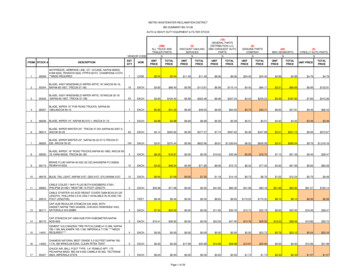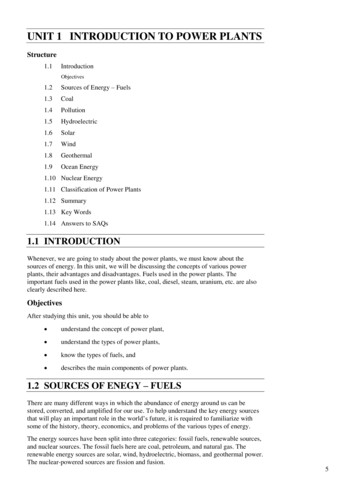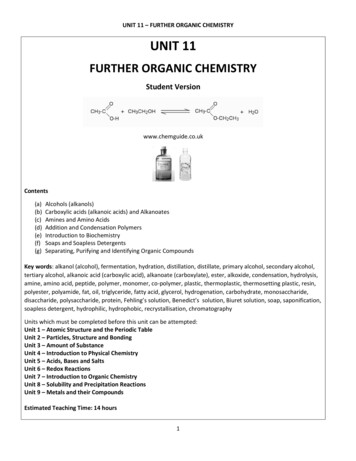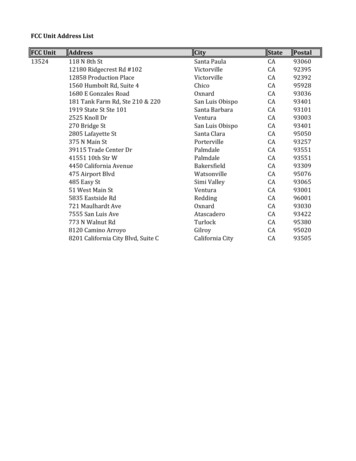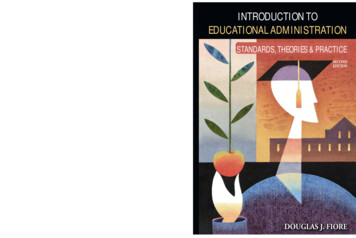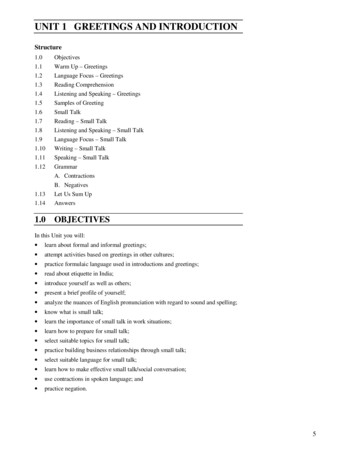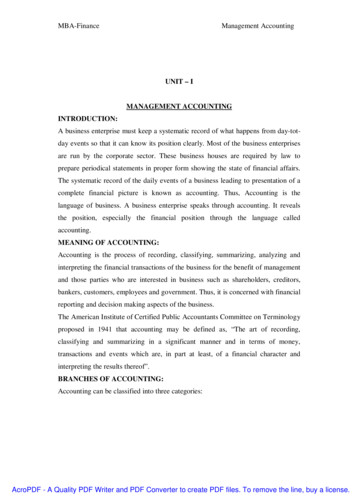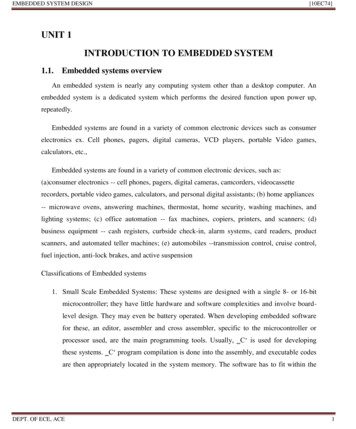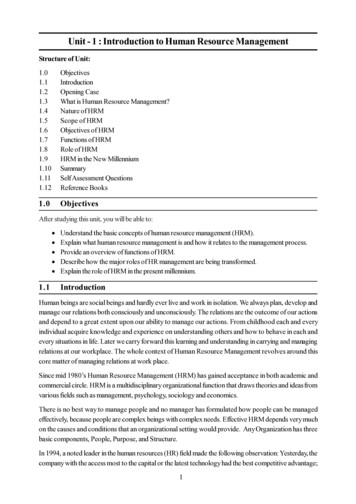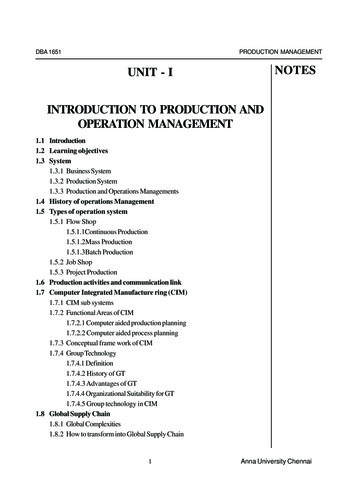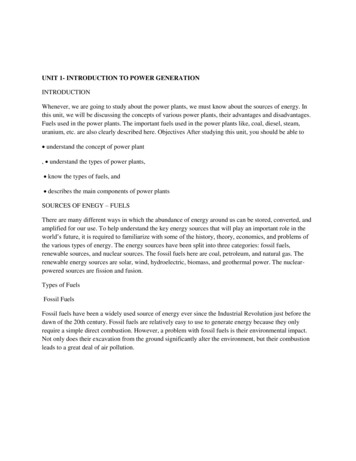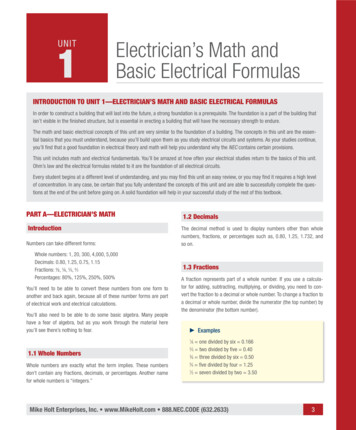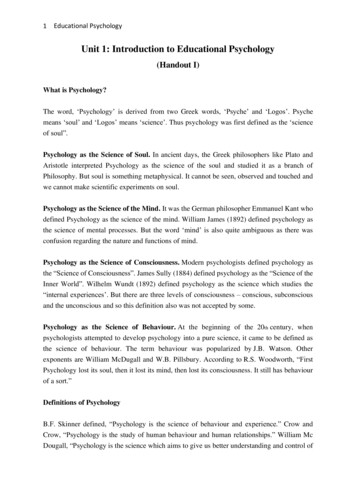
Transcription
1 Educational PsychologyUnit 1: Introduction to Educational Psychology(Handout I)What is Psychology?The word, ‘Psychology’ is derived from two Greek words, ‘Psyche’ and ‘Logos’. Psychemeans ‘soul’ and ‘Logos’ means ‘science’. Thus psychology was first defined as the ‘scienceof soul”.Psychology as the Science of Soul. In ancient days, the Greek philosophers like Plato andAristotle interpreted Psychology as the science of the soul and studied it as a branch ofPhilosophy. But soul is something metaphysical. It cannot be seen, observed and touched andwe cannot make scientific experiments on soul.Psychology as the Science of the Mind. It was the German philosopher Emmanuel Kant whodefined Psychology as the science of the mind. William James (1892) defined psychology asthe science of mental processes. But the word ‘mind’ is also quite ambiguous as there wasconfusion regarding the nature and functions of mind.Psychology as the Science of Consciousness. Modern psychologists defined psychology asthe “Science of Consciousness”. James Sully (1884) defined psychology as the “Science of theInner World”. Wilhelm Wundt (1892) defined psychology as the science which studies the“internal experiences’. But there are three levels of consciousness – conscious, subconsciousand the unconscious and so this definition also was not accepted by some.Psychology as the Science of Behaviour. At the beginning of the 20th century, whenpsychologists attempted to develop psychology into a pure science, it came to be defined asthe science of behaviour. The term behaviour was popularized by J.B. Watson. Otherexponents are William McDugall and W.B. Pillsbury. According to R.S. Woodworth, “FirstPsychology lost its soul, then it lost its mind, then lost its consciousness. It still has behaviourof a sort.”Definitions of PsychologyB.F. Skinner defined, “Psychology is the science of behaviour and experience.” Crow andCrow, “Psychology is the study of human behaviour and human relationships.” William McDougall, “Psychology is the science which aims to give us better understanding and control of
2 Educational Psychologythe behaviour of the organism as a whole.” Kurt Koffka, “Psychology is the scientific study ofthe behaviour of living creatures in their contact with the outer world.”Meaning of Educational PsychologyEducational psychology is one of the branches of psychology to study the behaviour of thelearner in relation to his education. As specialized branch of psychology concerns itself withsuggesting ways and means of improving the process and products of education, enabling theteacher to teach effectively and the learners to learn effectively with the minimum effort.It is thus designated as the service of education. It has simplified the tasks and improved theefficiency of the teacher or all those connected in the process and products of education bysupplying them with the essential knowledge and skills in much need the same way as scienceand technology has helped in making possible maximum output through minimum input interms of time and labour in our day-to-day activities.Educational psychology is that branch of psychology which deals with the application ofpsychological findings in the field of education. In other words it deals with the humanbehaviour in educational situations. It is the systematic study of the development of theindividual in the educational settings.It is the scientific study of human behaviour by which it can be understood, predicated anddirected by education to achieve goals of life.Definitions of Educational Psychology C.E. Skinner: “Educational psychology is the branch of psychology which deals withteaching and learning”.Crow and Crow: “Educational psychology describes and explains learning experience of an individual from birth to old age”.E. A. Peel: “Educational psychology is the science of education”.Trow describes, “Educational psychology is the study of psychological aspects of educational situations”.Stephens says, “Educational psychology is the study of educational growth anddevelopment”.Judd describes educational psychology as, “a scientific study of the life stages in thedevelopment of an individual from the time he is born until he becomes an adult.”In the words of E.A. Peel, “Educational psychology helps the teacher to understand thedevelopment of his pupils, the range and limits of their capacities, the processes by which theylearn and their social relationships.”
3 Educational Psychology(In this way, the work of the Educational Psychologist resembles with that of an Engineer, whois a technical expert. The Engineer supplies all the knowledge and skill essential for theaccomplishment of the job satisfactorily for example, construction of a bridge.). In the sameway Educational Psychologists, who is a technical expert in the field of Education, supplies allthe information, principles and techniques essential for:· Understanding the behaviour of the pupil in response to educational environment and· Desired modification of his behaviour to bring an all-round development of his personality.Thus, Educational Psychology concerned primarily with understanding the processes ofteaching and learning that take place within formal environments and developing ways ofimproving those methods. It covers important topics like learning theories; teaching methods;motivation; cognitive, emotional, and moral development; and parent-child relationships etc.In short, it is the scientific discipline that addresses the questions: “Why do some students learnmore than others?” and “What can be done to improve that learning?”The Nature of Educational Psychology:Its nature is scientific as it has been accepted that it is a Science of Education. We cansummarize the nature of Educational Psychology in the following ways:1. Educational Psychology is a science. (Science is a branch of study concerned withobservation of facts and establishment of verifiable general laws. Science employs certainobjective methods for the collection of data. It has its objectives of understanding, explaining,predicting and control of facts.) Like any other science, educational psychology has alsodeveloped objective methods of collection of data. It also aims at understanding, predictingand controlling human behaviour.2. Educational Psychology is a natural science. An educational psychologist conducts hisinvestigations, gathers his data and reaches his conclusions in exactly the same manner asphysicist or the biologist.3. Educational psychology is a social science. Like the sociologist, anthropologist, economistor political scientist, the educational psychologist studies human beings and their sociability.4. Educational psychology is a positive science. Normative science like Logic or Ethics dealswith facts as they ought to be. A positive science deals with facts as they are or as they operate.Educational psychology studies the child’s behaviour as it is, not, as it ought to be. So it is apositive science.5. Educational psychology is an applied science. It is the application of psychologicalprinciples in the field of education. By applying the principles and techniques of psychology,it tries to study the behaviour and experiences of the pupils. As a branch of psychology it is
4 Educational Psychologyparallel to any other applied psychology. For example, educational psychology draws heavilyfacts from such areas as developmental psychology, clinical psychology, abnormal psychologyand social psychology.6. Educational psychology is a developing or growing science. It is concerned with new andever new researches. As research findings accumulate, educational psychologists get betterinsight into the child’s nature and behaviour.Thus, educational psychology is an applied, positive, social, specific and practical science.While general science deals with behaviour of the individuals in various spheres, educationalpsychology studies the behaviour of the individual in educational sphere only.Nature of Educational psychology as scientific because:The nature of educational psychology is regarded as scientific because it is organized,systematic and universally accepted body, wherein the facts remain constantly in search oftruth through research and experimentation. Employs scientific methods in its study and itsresults are subjected to further verification and modification.1. Laws of educational psychology are universal: Educational psychology possesses awell-organized, systematic and universally accepted body of facts supported by therelevant psychological laws and principles.2. Scientific methods: Educational psychology employs scientific methods and adopts ascientific approach for studying the learner’s behaviour such as observation,experimentation, clinical investigation and generalization, etc.3. Constant search of the truth: The results of any study in educational psychology canbe challenged and are modified or altered in terms of the latest explanations andfindings. So the findings of any study are never taken as absolute and permanent.4. Reliability: Educational psychology does not accept hearsay and not take anything forgranted. It emphasizes that essentially there is some definite causes linked with abehaviour and the causes of this behaviour are not related to supernatural phenomena.5. Positive science: Educational psychology is a positive science rather than a normativescience.6. Applied behavioural science: Educational psychology is an applied/behaviouralscience.7. Developing positive science: Educational psychology cannot claim the status of adeveloped positive science like other natural or applied sciences. It is considered as oneof the developing positive sciences of the learner’s behaviour.
5 Educational PsychologyObjectives of Educational Psychology:The general objectives of educational psychology are:1. To provide a body of facts and methods which can be used in solving teaching problems.2. To develop a scientific and problem-solving attitude.3. To train in thinking psychologically about educational problems.Education vs SchoolingEven though schooling is frequently misidentified as education, there ismuch difference between education and schooling. The term educationencompasses basically two meanings. They are formal and informal waysof gaining knowledge while schooling stands for the initial and secondarystage of formal education system that take place in school. Education asmentioned above can take place not only through informal ways such aslearning from peers, life experiences, by reading or learning things throughonline sources but also through formal means. For instance, througheducational institutions like school, university or even training colleges.Thus, it becomes clear schooling is one branch of formal education in thewide arena of education.Teaching Objectives of Educational Psychology:1. To develop an understanding and appreciation of the dietary and environmental factorswhich underline learning ability.2. To provide base for understanding the nature and principles of learning and to supply thetechniques for its improvement.3. To understand and appreciated factors influencing individual ability to learn.4. To provide understanding of the external factors like training aids, libraries, classroomswhich are largely within the control of the teacher and the institution.5. To evaluate teaching efficiency.6. To develop an appreciation of the individual and importance of the individual with theirindividual differences.Scope of Educational Psychology:Scope of educational psychology tells us the areas of application. In other words, it can becalled the subject matter of educational psychology.1. Human Behaviour. It studies human behaviour in the educational context. Psychologyis the study of behaviour and education aims at modification of behaviour. Hence theinfluence of Educational Psychology has to be reflected in all aspects of education.
6 Educational Psychology2. Growth and development. It studies the principles governing growth anddevelopment. The insight provided by the study will help in scientifically planning andexecuting learner oriented programmes of education.3. The Learner. The subject-matter of educational psychology is knitted around thelearner. Therefore, the need of knowing the learner and the techniques of knowing himwell. The topics include – the innate abilities and capacities of the individuals,individual differences and their measurements, the overt, covert, conscious as well asunconscious behaviour of the learner, the characteristics of his growth and developmentand each stage beginning from childhood to adulthood.4. The Learning Experiences. Educational Psychology helps in deciding what learningexperiences are desirable, at what stage of the growth and development of the learner,so that these experiences can be acquired with a greater ease and satisfaction.5. Learning process: After knowing the learner and deciding what learning experiencesare to be provided, Educational Psychology moves on to the laws, principles andtheories of learning. Other items in the learning process are remembering andforgetting, perceiving, concept formation, thinking and reasoning, problem solving,transfer of learning, ways and means of effective learning etc.6. Learning Situation or Environment. Here we deal with the environmental factors andlearning situations which come midway between the learner and the teacher. Topicslike classroom climate and group dynamics, techniques and aids that facilitate learningand evaluation, techniques and practices, guidance and counselling etc. For the smoothfunctioning of the teaching-learning process.7. Evaluation of learning process: Some forms of evaluation inevitable in teaching. Alsoin all fields of activity when judgments used to be made, evaluation plays an importantrole. Even when we want to cross a road we make a judgment whether it is safe to crossthe road. Effectiveness of learning process always depen
Psychology lost its soul, then it lost its mind, then lost its consciousness. It still has behaviour of a sort.” Definitions of Psychology B.F. Skinner defined, “Psychology is the science of behaviour and experience.” Crow and Crow, “Psychology is the study of human behaviour and human relationships.” William Mc Dougall, “Psychology is the science which aims to give us better .
